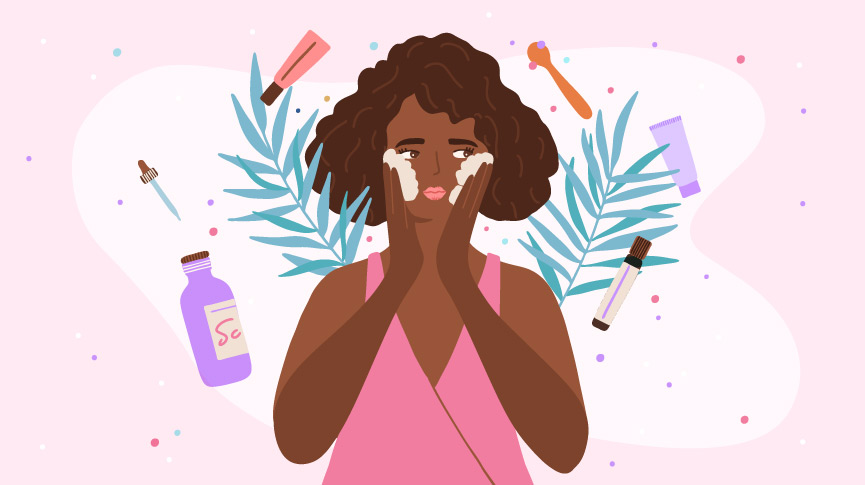How Your Skincare Affects Your Health (and Hormones)?

We often think of our skincare as just something we slap on our face and body, and that’s it, it stays there.
While this is understandable, it neglects the fact that the skin is the largest organ of the body. Meaning it’s just not something that houses our organs and bones, but is just as alive, dynamic, and important as your lungs and heart.
It kind of makes you think about what you’ve been putting on it.
Let’s put it this way – when you put things on your skin, it goes in your body. While the exact amount is up for debate, a significant amount of the ingredients that you put on your skin, absorb into your bloodstream.
Think of the body as a holistic, or whole, being. One where each system is connected and supports each other. This means that skincare isn’t merely just something that keeps your acne at bay and minimizes wrinkles, but an opportunity to care for your health in a new way.
The Intelligence of The Skin
Have you heard the theory that where acne is on your face can tell you what sort of imbalances you may have, like digestive or hormonal? You know that you may develop a rash or hives when your body has an allergic or inflammatory response. You’ve seen the effects bacteria can have on an open wound.
Our skin is incredible at communicating with us about what is going on with our health. It is the bridge between the world within us and outside of us. It makes sense that what we put on it matters, right?
Toxins in Skincare
The Environmental Working Group breaks down the prevalence of toxic ingredients in skincare. “Since 2009, 595 cosmetics manufacturers have reported using 88 chemicals, in more than 73,000 products, that have been linked to cancer, birth defects or reproductive harm.”
They continue to discuss other potentially harmful ingredients like Formaldehyde, Mercury, Dibutyl, diethylhexyl, Isobutyl, and isopropyl.
Many commonly used cosmetic ingredients can contribute to reproductive health issues, disrupt hormones, affect the kidneys and nervous system, damage DNA, and sensitize the skin.
That’s not to say that skincare that uses chemical ingredients is necessarily bad and should always be avoided, but that we should pay close attention to what we put on our skin.
It’s also important to note that any ingredient that’s somewhat toxic to humans also affects the earth and water systems. That’s why we’re seeing growing regulation around sunscreen ingredients, because of the effects that chemicals have on coral reefs and other aquatic life.
Skincare as Medicine
Just as the ingredients in your skincare can potentially cause harm, they can also do good.
Skincare ingredients, especially ones that are made from natural and botanical ingredients can alternatively go into the body and support your health (yes, and hormones).
Many plants and other natural ingredients have potent healing effects. That’s why when you use a topical balm for pain, it works from the outside in.
A lot of people try to opt for organic ingredients which may lower your exposure to pesticides and other chemicals, but that’s not always necessary. You make your skincare work for you.
Skincare is not only an opportunity to get your glow on but can also be an invitation for health. So invite good ingredients into your body!
Skincare Moving Forward
We’re not here to scare you or tell you to throw out all your cosmetics and start new. Life is about balance, and frankly, it’s not realistic to avoid all chemicals or potentially toxic ingredients.
Moving forward you might want to spend a little bit more time reading reviews and looking at ingredients. There are so many incredible beauty brands out there that have your health and the planet in mind.
A great resource is the Environmental Working Group’s Skin Deep page. Here you can see a breakdown of thousands of products and the rankings in categories like immunotoxicity and allergies, developmental and reproductive toxicity, and carcinogenic properties.
Your skincare shouldn’t stress you out. It should be a tool you can use to practice self-care and one that doesn’t break the bank.
Typically the fewer ingredients a product has, the less of a chance it will impact you negatively. Smaller skincare businesses usually have more of a focus on clean ingredients and environmental impact.
If you’re feeling crafty, you can even try creating your own skincare! You can find plenty of DIY recipes on Pinterest, and just by looking up what you want to make.
Your skin’s health isn’t just about what you put on it, but what you eat, how hydrated you are, genetics, where you live, and so many other factors. It can take time to figure out just what your skin truly needs, especially if you’re just starting your transition to more natural skincare.
So take your time, enjoy, and treat yourself!

Natasha (she/her) is a full-spectrum doula and health+wellness copywriter. Her work focuses on deconstructing the shame, stigma, and barriers people carry around birth, sex, health, and beyond, to help people navigate through their lives with more education and empowerment. You can connect with Natasha on IG @natasha.s.weiss.


